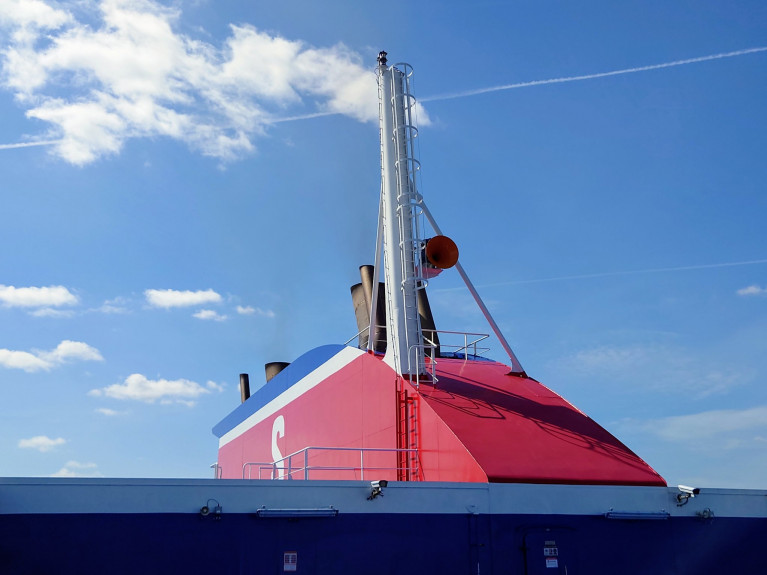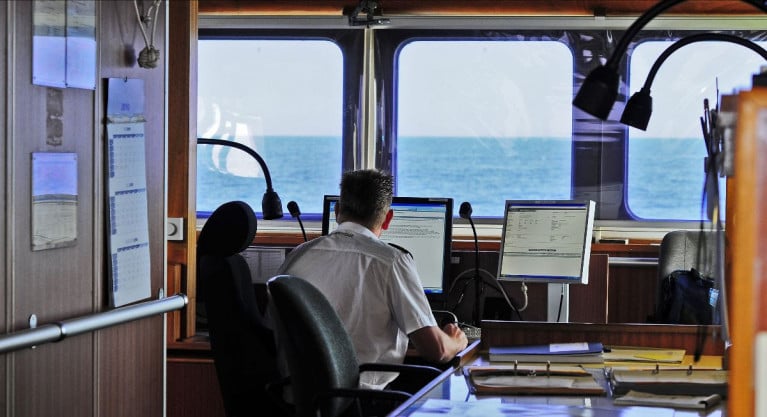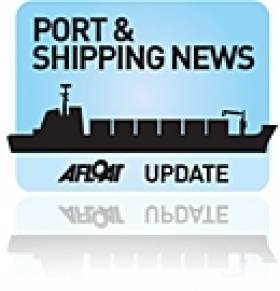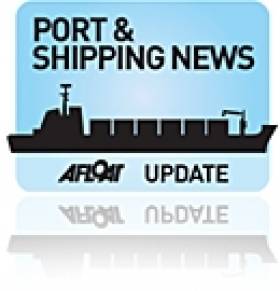Displaying items by tag: Day of the Seafarer
Stena Line to Sound Horns In Port Today In Support of International ‘Day of the Seafarer’
At 12 noon (local time) today, 25 June all Stena Line vessels will sound their horns in port to support of seafarers around the world.
More than 1.6 million men and women are keyworkers in keeping vital supply lines open during the global pandemic COVID-19.
The International Chamber of Shipping (ICS), along with industry associations, companies and social partners are calling on shipowners, masters and crews around the world to sound their horns in ports at 1200 noon.
The initiative called #ShoutOutForSeafarers is made in honour of the International Maritime Organization's (IMO) international ‘Day of the Seafarer’ to remind the world about the important role of all, more than 1.6 million seafarers around the world.
The operator is one of the largest ferry companies with more than 4.300 employees, currently operating 37 vessels on 17 ferry routes in the Baltic Sea, Scandinavica, North Sea and the Irish Sea.
”As part of our vision to connect Europe for a sustainable future, we have continued to sail throughout the whole pandemic, to keep vital supply lines open. We have transported millions of tonnes of goods such as medicines and equipment for healthcare, as well as fresh food and drinks. But, we have also connected people, for essential travel and now when societies are opening up we will reconnect families and friends again after many months apart" said Ian Hampton, Chief People, Communications and Fleet Operations Officer
He added "We want to highlight the important work undertaken 24 hours a day, seven days a week, by our key workers, the seafarers onboard our vessels, by participating in this great initiative”
Read more about the #shoutoutforseafarers initiative click here.
The sound of the horn from the leadship of E-Flexer next generation ferries, Stena Estrid sailing on the Irish Sea can be downloaded this link.
Webinar: Celebrating the Contribution of Seafarers and Asking the Question 'Where Next?'
The Nautical Institute is to host a webinar this Thursday (25 June) at 1400 BST (UK time).
So here's an opportunity to join the Nautical Institute CEO Captain John Lloyd and a distinguished panel of international experts in celebrating the contribution of seafarers everywhere and examining what lies ahead for the maritime industry.
The webinar will be held on the 'Day of the Seafarer' to pay tribute to seafarers around the globe, acknowledging their sacrifice and the issues they face.
Many seafarers have been away from home for months and are unsure when they will be able to return home due to travel restrictions. The panel will seek to raise awareness of the work done by seafarers in response to the pandemic and thank them for their contribution.
This webinar will also explore the future of the seafarer, post Covid 19 and in an age of advanced technology and environmental concerns. What will be the impact of automation, increased regulation and even the growing use of renewables for propulsion?
This webinar will be fully interactive, inviting questions from attendees and will provide a certificate of participation to all those who attend.
To register for the event click this link.
#SeafarersMatter - Today 25 June is the Day of the Seafarer (DotS) an annual event which celebrates and recognises the role that people have on our oceans.
The theme of this year's Dots event run by the International Maritime Organisation (IMO) is that 'Seafarers Matter'
DotS was established in a resolution adopted by the 2010 Diplomatic Conference in Manila to adopt the revised STCW Convention. Its stated purpose is to recognize the unique contribution made by seafarers from all over the world to international seaborne trade, the world economy and civil society as a whole.
The resolution "encourages Governments, shipping organizations, companies, shipowners and all other parties concerned to duly and appropriately promote the Day of the Seafarer and take action to celebrate it meaningfully".
On this Day of the Seafarer, the organiers wanted particularly for ports to engage and by having seafarer centres demonstrate how much seafarers matter to them. The idea is for ports and seafarer centres to share and showcase best practices in seafarer support and welfare.
During today special activities for seafarers will be held, for example the following events:
Social events organised in port to celebrate seafarers
Public open day at seafarer centres
Free wi-fi in port for a day
Ports & Shipping Review. Cargoships, WFSVs, Cork Ferry, IMERC, Dutch Navy & Last H&W Ferry Sold
#PORTS & SHIPPING REVIEW - Over the last fortnight Jehan Ashmore reports from the shipping scene which saw a 'Pop-Up Village' delivered by cargoship to Galway Port in readiness for the Volvo Ocean Race festival which started yesterday and continues to 8 July.
Arklow Marine Services second wind-farm support vessel (WFSV) Gardian 10 was launched for UK owners and today the vessel travelled from Arklow to Belfast Port and berthed at the Abercorn Basin.
In the rebel county, efforts to revive the Cork-Swansea route took a new step when a group was formed to ascess the feasibility in re-launching the Celtic Sea link that closed last November after Fastnet Line went into examinership.
At the Taoiseach's Public Service Excellence Awards, the Irish Maritime Energy Research Centre (IMERC) based in Haulbowline, Cork Harbour, won an award which was presented by Minister for Justice Alan Shatter T.D. at a ceremony held in Dublin Castle.
Across the world the International Maritime Organisation (IMO) highlighted the Day of the Seafarer on 25 June, where the role of those who work on ships provide a vital service in transporting essential goods on a global scale to meet our needs on a daily basis.
Dublin Port welcomed a flotilla from the Royal Netherlands Navy this weekend, where two of the vessels including a torpedo-training ship HNMLS Mercuur (A 900) was open to the public.
Today the cruiseship Saga Sapphire made her maiden 'Irish' port of call to Cobh having entered service in March for UK based operator Saga Cruises. The 706-passenger capacity ship is due to dock at Dublin Port tomorrow morning.
Former North Channel ferry stalwart Stena Caledonia which operated on the Larne/Belfast-Stranraer routes since 1990 has been sold by Stena Line to ASDP Ferry of Indonesia. She is the last ever passenger ship to have been built by Harland & Wolff shipyard in Belfast.
#PORTS & SHIPPING – Today is the International Day of the Seafarer, and people around the world are being asked to use social networks to highlight just how important seafarers are as they transport more than 90% of global trade which are vital to our daily lives.
On this second year of the Day of the Seafarer, people are asked to tell the world of an object in their daily life that you can't live without, and which came by sea.
Take a photo of the object, write a description, record a song, make a film, whatever you prefer: and then just post it on the social platform of your choice and add the campaign slogan: "thank you seafarers".
Seafarers leave their homes and families, often for long periods to ensure that essential items and commodities on which our lives depend arrive safely at our homes.
So show the seafarers of the world - and your friends, too – your appreciation of the extraordinary services they render every day of their professional lives, under demanding and sometimes dangerous circumstances.
Day of the Seafarer is an innovative campaign that harnesses the power of social media to raise awareness of seafarers and their unique role. Everyone, regardless of where they live, can join the campaign online. So, on 25 June, you can join in by:
Sharing your post on Facebook, if you have pictures, videos or any special message, please share them on our wall.
Sending us a message @IMOHQ and @SeafarerDay using hashtag #thankyouseafarer
On pinterest, you can pin a picture of your chosen object with the caption "Day of the Seafarer"
For more infomation and for how participants can download the toolkits available of the campaign click HERE. In addition for a video message by Koji Sekimizu, Secretary-General of the International Maritime Organization (IMO).
The IMO is the United Nations specialized agency with responsibility for the safety and security of shipping and the prevention of marine pollution by ships. The organisation is headquartered in London on the banks of the Thames.



























































